Key takeaways:
- Digital marketing tools enhance effectiveness and strategy, with categories including content creation, social media management, analytics, and CRM software being essential for cohesive marketing efforts.
- Top analytics tools like Google Analytics and Hotjar provide crucial insights into audience behavior, enabling data-driven decision-making that optimizes marketing strategies.
- Popular tools like Mailchimp and Canva facilitate user-friendly engagement in email marketing and content creation, making these processes enjoyable and effective for marketers.
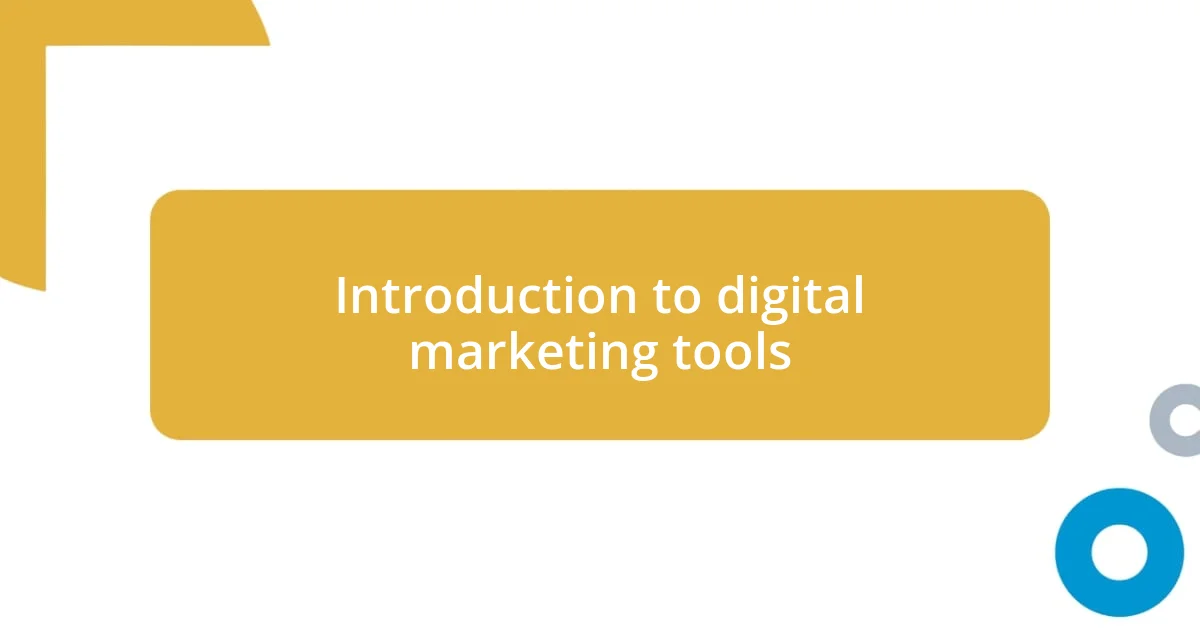
Introduction to digital marketing tools
Digital marketing tools have become indispensable in today’s fast-paced online environment. I still remember the first time I stumbled upon SEO software; it was like finding a hidden treasure that transformed the way I approached my campaigns. Have you ever felt overwhelmed by all the options out there? You’re not alone!
Each tool offers unique functions designed to amplify various aspects of marketing, from social media management to analytics. I vividly recall my initial struggles with tracking engagement metrics—until I discovered a simple analytics tool that changed the game for me. The right tools can elevate your marketing strategy, helping you make data-driven decisions that genuinely resonate with your audience.
As we dive deeper into this topic, I find that exploring these tools isn’t just about listing software. It’s about understanding how each tool can empower you to connect with your audience authentically and effectively. Whether you’re a seasoned marketer or just starting out, embracing digital marketing tools is a journey filled with discovery. So, are you ready to find your favorites?
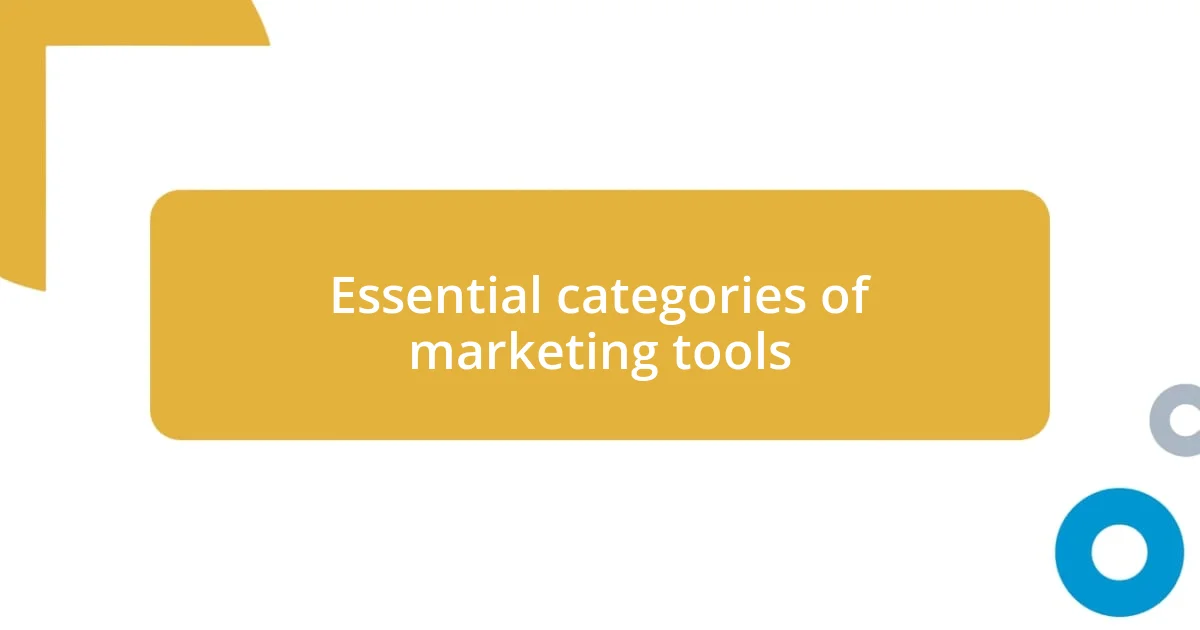
Essential categories of marketing tools
When considering essential categories of marketing tools, it’s important to understand how they intersect to support your overall strategy. For instance, I often think about the synergy between content creation and social media management tools. I once launched a campaign without leveraging a social media scheduling tool and found myself scrambling to post timely content. It taught me how vital it is to have those categories working together to ensure a seamless marketing effort.
Analytics tools hold a special place in my heart because they provide the insights needed to gauge the effectiveness of your campaigns. After realizing that my gut feelings weren’t enough to inform my strategy, I turned to these tools and found an entirely new level of focus. Knowing exactly how my audience interacts with my content was a game-changer, making me feel more in control of my marketing trajectory.
Finally, customer relationship management (CRM) software is another essential category I can’t overlook. When I was managing multiple projects, I felt overwhelmed without a system to keep track of interactions. A good CRM not only organizes information but also connects insights that can enhance customer engagement. Suddenly, I was able to nurture leads more effectively and see the big picture.
| Category | Function |
|---|---|
| Content Creation | Tools for writing, graphic design, and multimedia production |
| Social Media Management | Scheduling and analyzing social media posts |
| Analytics | Tracking and measuring marketing performance |
| CRM | Managing customer interactions and relationships |
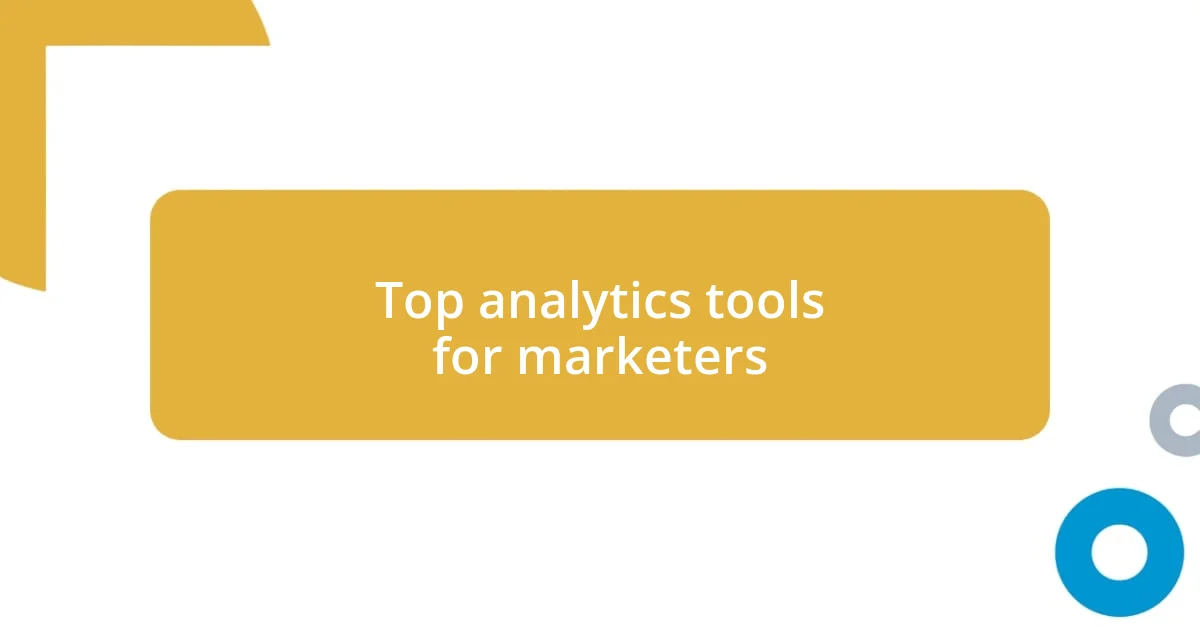
Top analytics tools for marketers
I’ve spent countless hours diving into various analytics tools, each one revealing new insights into my campaigns. It’s like being given a map to navigate through the often chaotic sea of data. One tool that particularly stands out for me is Google Analytics. I remember the first time I delved into its real-time data features—I was mesmerized watching how users from all over the world interacted with my content in that very moment. That experience taught me the importance of real-time insights and how they can guide immediate marketing adjustments.
Here are some top analytics tools that every marketer should consider:
- Google Analytics: Offers comprehensive insights into website traffic and user behavior.
- Adobe Analytics: Provides robust data analysis tools for more detailed customer insights.
- Hotjar: Allows visual insights through heatmaps and session recordings, so you can see how users interact with your site.
- Mixpanel: Focuses on tracking user engagement and retention over time.
- SEMrush: Offers analytics for SEO, paid traffic, and social media, providing a well-rounded view of your digital presence.
When I discovered Hotjar, it was like putting on a new pair of glasses. Instead of just seeing numbers, I could visualize how visitors navigated my site. Watching the heatmaps and understanding where users clicked transformed the way I approached website design and content placement. These tools have not only enhanced my strategies but also made my marketing efforts feel more human, grounded in real user experiences.
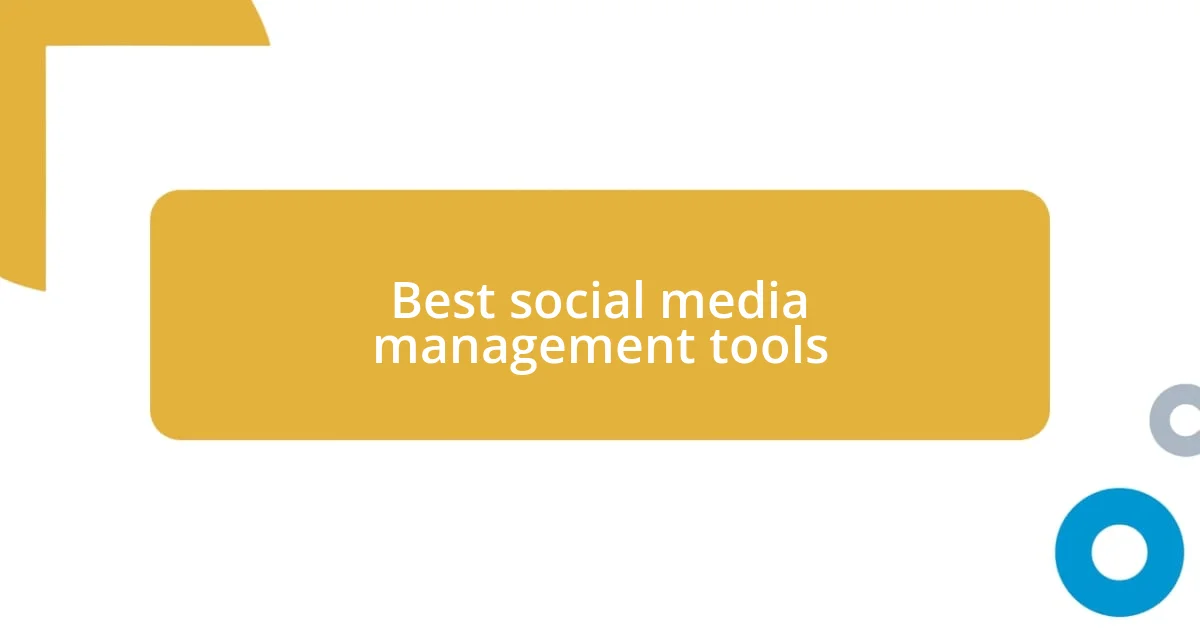
Best social media management tools
Managing social media can be overwhelming, but the right tools can simplify the process significantly. One standout for me has been Hootsuite. I vividly remember feeling lost trying to juggle multiple accounts and content schedules until I started using it. Its dashboard allowed me to monitor everything from one place, and that was a revelation! It’s incredible how a good organizational tool can make you feel more empowered and less stressed.
Another gem is Buffer. When I used Buffer for the first time, I felt like I had an extra pair of hands. The scheduling aspect freed up so much of my time for creativity and engagement. Seeing my posts go live at optimal times made a noticeable difference in audience interaction and reach. Have you ever had a tool transform a tedious task into something enjoyable? That’s exactly how Buffer felt for me.
I can’t forget to mention Sprout Social, which offers amazing analytic capabilities alongside its scheduling features. I remember diving into the reports after my first month of using it. It was like uncovering a treasure trove of information about my audience’s behavior. Those insights helped guide my content strategy, highlighting which posts resonated best. It’s no wonder why I recommend it to fellow marketers—it really bridges the gap between posting and understanding your audience.
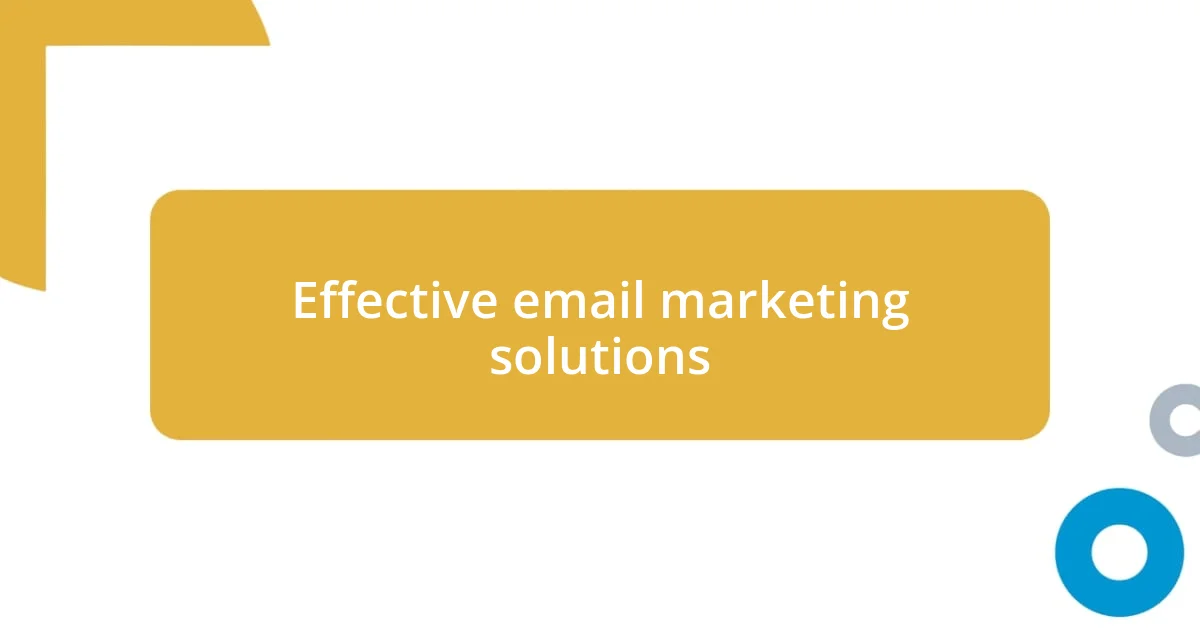
Effective email marketing solutions
Email marketing has become a cornerstone of my digital marketing strategy, and finding the right solutions has been pivotal. One tool that I’ve found invaluable is Mailchimp. I recall my initial experience using it to launch a newsletter—it was like stepping onto a stage and finally having the spotlight on me. The ease of creating beautiful email templates made it not just a task, but an enjoyable part of my routine. Have you ever experienced that rush of seeing your ideas come to life? That’s what Mailchimp offers.
Another impressive solution I’ve tried is Constant Contact. I remember crafting my first email campaign and being amazed at how user-friendly it was. The analytics it provided after sending out emails opened my eyes. I could see who was opening, clicking, and even unsubscribing. The data wasn’t just numbers; it was telling me a story about my audience’s preferences. It made me rethink my approach and really engage my subscribers in a more relevant way.
I’ve also dabbled in ActiveCampaign, which I found to be a game-changer for automation. The first time I set up an automated welcome series, I felt a mix of excitement and apprehension. Would it resonate? Watching new subscribers receive tailored messages felt like magic; it was as if I were having personal conversations without being present. This blend of automation and personalization truly allows me to connect with my audience, enhancing the way I run my email marketing campaigns.
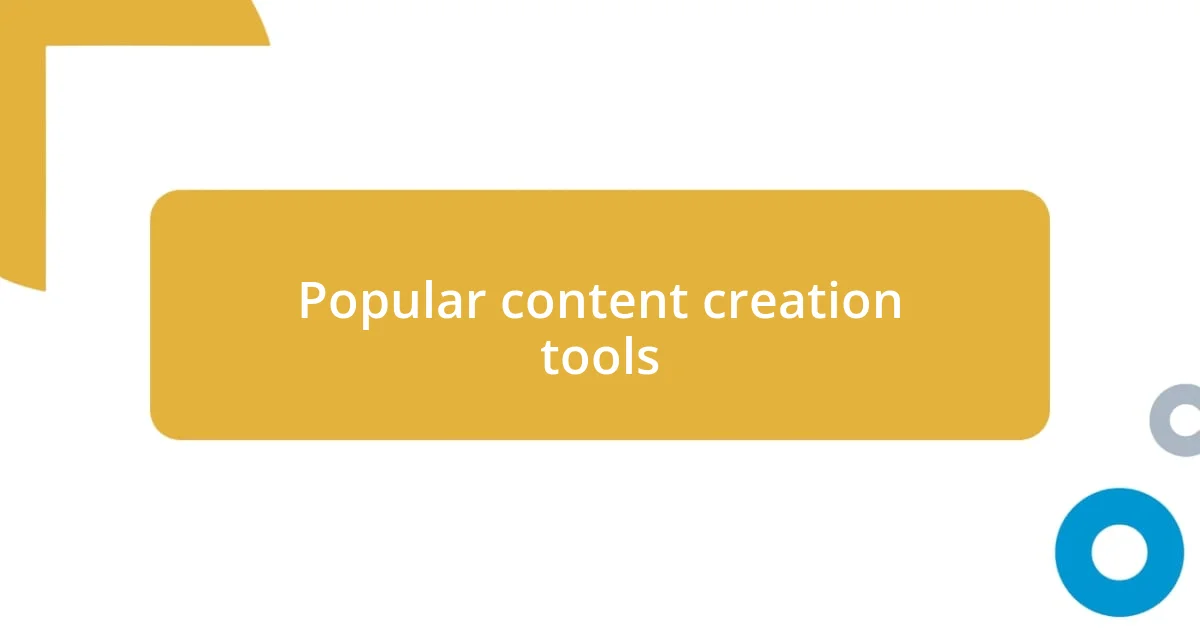
Popular content creation tools

Popular content creation tools
When it comes to producing eye-catching content, Canva is a tool I can’t recommend enough. I still remember the first time I designed a social media graphic from scratch. The process felt surprisingly effortless, and the array of templates sparked my creativity like never before. Have you ever felt like a professional designer just because a tool made it so easy? That’s the magic of Canva for me—it’s empowering, allowing anyone to create stunning visuals without the need for extensive graphic design knowledge.
Another tool that has transformed my content creation journey is Grammarly. When I first started using it, I was amazed at how it not only corrected my grammar but also helped me refine my tone and clarity. It felt like having a personal editor by my side, helping to elevate my writing. Do you ever worry about how your words will be received? Grammarly has given me the confidence to share my thoughts, knowing they come across clearly and professionally.
I also can’t overlook the value of BuzzSumo in my content strategy. I vividly recall using it to research trending topics for my blog; it felt like wielding a powerful tool in a treasure hunt. The insights on what’s resonating with audiences instantly provided direction for my content ideas. Have you ever felt a rush when you uncover exactly what you need to engage your audience? That thrill of discovery is what BuzzSumo delivers, turning research into a dynamic and strategic part of my creative process.
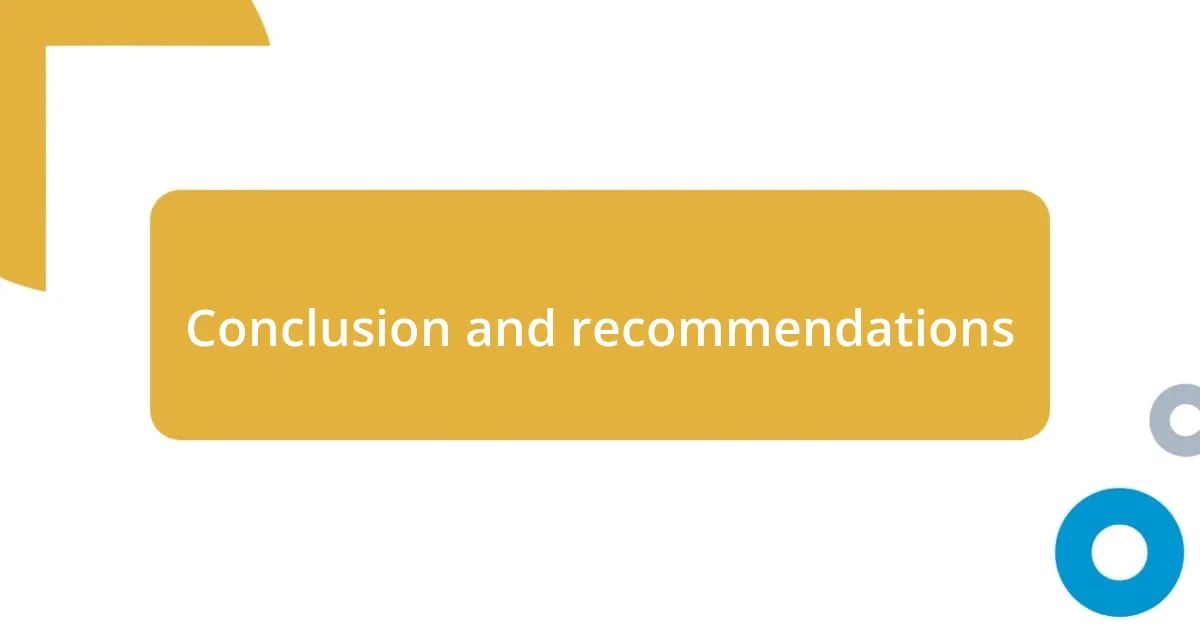
Conclusion and recommendations
In conclusion, choosing the right digital marketing tools can greatly enhance your effectiveness and efficiency. My recommendation is to start with those that resonate personally with you, like I did with Mailchimp and Canva. Have you ever found a tool that just clicks with your style? Embrace that feeling and explore how it can elevate your strategies.
Also, don’t be afraid to experiment with automation tools like ActiveCampaign and content research platforms like BuzzSumo. I remember the relief I felt when I started automating repetitive tasks; it freed up my time for more creative pursuits. Think about what tasks consume your time—imagine how much more you could accomplish if you streamlined those processes!
Finally, always keep learning and adjusting based on insights from analytics. Just like my approach with Constant Contact changed after analyzing subscriber behavior, I encourage you to let data inform your decisions. Have you ever unlocked a new level of understanding about your audience through analytics? That moment can be incredibly empowering and transformative for your marketing efforts.














